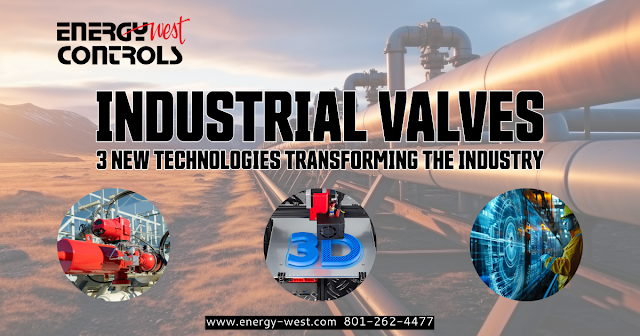Three significant technological advances may revolutionize the future of industrial valves and valve automation in various markets. These advancements aim to improve efficiency, reliability, and sustainability in industries such as oil and gas, chemical processing, and water treatment.
1955 West Industrial Circle
Salt Lake City, Utah 84104
Phone: 801-262-4477
Fax: 801-261-0862
Web: https://energy-west.com
- Smart Valves and Predictive Maintenance: Integrating smart sensors and artificial intelligence (AI) is one of industrial valves' most influential technological advances. Manufacturers equip smart valves with sensors that continuously monitor various parameters, such as pressure, temperature, and flow rate. AI algorithms analyze the data collected by these sensors, detecting anomalies and predicting potential valve failures before they occur. This predictive maintenance approach allows timely repairs and replacements, minimizes downtime, and increases system reliability. Industries such as oil and gas, where unplanned shutdowns can be extremely costly, are already adopting smart valve technology to optimize their operations and reduce maintenance costs.
- 3D Printing and Advanced Materials: 3D printing technology is transforming the manufacturing of industrial valves. With 3D printing, manufacturers can produce valve components quickly and cost-effectively, reducing lead times and inventory costs. Additionally, 3D printing enables the creation of complex valve geometries that were previously impossible to manufacture using traditional methods. This innovation allows for the development of valves with improved flow characteristics, reduced pressure drop, and enhanced performance. Furthermore, manufacturers increasingly use advanced materials, such as high-performance polymers and ceramic matrix composites, in valve manufacturing. These materials offer superior resistance to corrosion, high temperatures, and wear, making them ideal for demanding applications in the chemical processing and power generation industries.
- Digital Twin Technology and Virtual Commissioning: Digital twin technology is another game-changer in industrial valves and valve automation. Engineers create a digital twin, a virtual replica of a physical valve system, using real-time sensors and historical performance data. This technology allows for the simulation and optimization of valve performance under various operating conditions without physical testing. Using digital twins, engineers can identify potential issues, test different control strategies, and optimize valve settings for maximum efficiency. Virtual commissioning, which involves testing and validating control systems using digital twins, is becoming increasingly popular in the water treatment and pharmaceutical industries. This approach reduces the time and cost associated with physical commissioning and ensures that the valve system performs as expected from the outset.
1955 West Industrial Circle
Salt Lake City, Utah 84104
Phone: 801-262-4477
Fax: 801-261-0862
Web: https://energy-west.com
